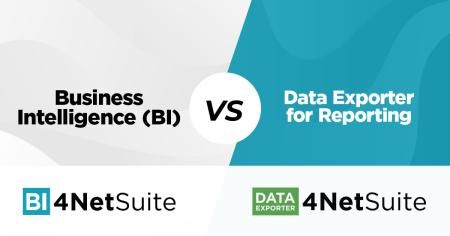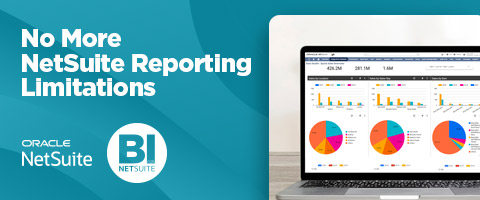Table of Contents:
- Top Reporting Challenges in NetSuite and Other ERP Systems
- Why Reporting Solutions Must Be Tailored to Your Business Needs
- Is a BI Tool Necessary for NetSuite ERP Reporting?
- Comparing NetSuite BI and Data Exporter Tools for Reporting
- How the GURUS NetSuite Data Toolkit Enhances Reporting and Exports
A company’s investment in ERP typically begins when faced with solving the challenges in reconciling the islands of information sitting in disjointed systems. With this in mind, implementing an ERP system creates a better version of a company’s operations by joining together the unique processes that drive its growth and success.
Request More Info About BI vs. Data Exporter for Reporting
Top Reporting Challenges in NetSuite and Other ERP Systems
ERP systems are focused on operational success, which leads to the assumption that these systems will strategically drive businesses forward. In other words, if an ERP system has centralized all of a company’s key operational activities, then it will also provide the organization with the necessary tools to easily find this data to drive better decision-making. Unfortunately, this is often not the case.
In the early stages of an ERP’s usage, companies will be leaps and bounds ahead of their previous systems in reporting on their daily activities. A better visibility on the true state of affairs will be evident. The simple fact of having role-based dashboards across all departments in a single system will directly impact productivity and deliver the competitive edge necessary for growth.
The challenge presents itself later as ERP systems are primarily designed to absorb data instead of providing the in-depth analysis that impacts a business.
While NetSuite ERP has done an excellent job when it comes to such features as robust canned reports, analytics, and powerful saved searches, it has its limitations.
These features will most likely solve 80% of a business’s core reporting requirements, but the remaining 20% leaves a reporting gap that needs to be filled.
Why Reporting Solutions Must Be Tailored to Your Business Needs
As companies mature, so do the expectations of the systems. What was once seen as a remarkable improvement is now internalized as a given fact. As companies continue to develop their processes, they gain a deeper knowledge of each system, and begin to maximize usage of their ERP. This means transforming operational ERP into strategic ERP, where better reporting and Business Intelligence comes into the picture.
Determining when to invest in a full-blown Business Intelligence initiative or address specific reporting gaps in your current ERP all depends on the use cases at hand. There are many factors to consider when assessing your reporting needs:
- Are your reporting and analytics challenges limited to a few use cases? Or are the problems more pervasive across the company?
- Does your current ERP system house most of your reporting data? Or do you need to mine other systems and data sets?
- Who are your primary stakeholders? Operations? The Executive Team?
- Are you addressing time-sensitive operational reporting? Or more strategic forecasting insights?
- What is the volume of data that needs to be mined?
- Is reporting primarily for internal purposes? Or do you need to share information and collaborate with external partners and customers?
Depending on your response to these questions, the use case for Business Intelligence versus Data Exporter will vary. A solution like Business Intelligence requires a careful understanding of a company’s data challenges and the reporting limitations faced in the current ERP system.
Is a BI Tool Necessary for NetSuite ERP Reporting?
Generating reports within the confines of NetSuite ERP will deliver robust dashboards and flexible reporting on core business needs. However, like any major ERP system, NetSuite reporting is limited to the data schema available. The bi-directionality of records, transactions, and entities can affect the flexibility in designing reports. Customers who push the boundaries of Netsuite reporting can face limitations in:
- Data Visualization: An easy slicing, dicing and drilling into visuals for strategic decision making
- Joining Data: The ability to join data across multiple tables, data sets and data levels
- Data Volume: Report quickly and efficiently on large volumes of data for historical reporting
If two out of these three limitations plague your organization, looking at a Business Intelligence (BI) solution is the practical option. It’s important to consider the larger picture when it comes to investing in a BI tool.
For example, business challenges like, the inability to manage multiple reports, importing and exporting reports from an external system, or out-dated manual processes, are top reasons to invest in a BI tool.
The key advantage of a BI initiative is its ability to bypass the walls of the current ERP’s data schema and rebuild a more flexible model. This would be housed in a powerful data warehouse that will allow the business to scale with its evolving data sets.
Comparing NetSuite BI and Data Exporter Tools for Reporting
The combination of analytics, saved searches, and canned reports delivered with NetSuite provides a very powerful toolbox of reporting capabilities. These can address most operational reporting needs with limited effort.
Should the use cases get more complex than the tools at hand, NetSuite scripting can come into play to develop the reporting needed. With that being said, use cases should be isolated instances to reduce the maintenance of highly customized reports. Where possible, specific use cases can be solved with creative solutions that eliminate expenses generated by scripting.
One good example is to leverage pre-built partner solutions like the spreadsheet plug-in Data Exporter, which synchronizes multiple NetSuite Saved Searches into a Google Sheet. The consolidation of data will provide more flexibility in accessing reports across multiple tables. This tactical approach to addressing specific operational reporting is an effective way to maximize your reporting from NetSuite without necessarily going down the BI path.
For organizations that lack the experience with their NetSuite system, a tool like the Data Exporter is a great way to ensure you get the most out of your current reporting capabilities.
Now when it comes to customers with mature reporting needs, the requirement for a much more strategic forecasting on large data sets becomes vital to their decision making.
This is where Business Intelligence for NetSuite (BI4NetSuite) comes into play. It will facilitate more robust analytics and provide the necessary flexibility to extract data more efficiently. Its data warehouse is designed to control NetSuite in a more usable manner as well as set up your ERP with specialized data visualization capabilities. This will transform a company’s NetSuite instance into a strategic system leveraged by all ranks within the organization.
How the GURUS NetSuite Data Toolkit Enhances Reporting and Exports
GURUS Solutions is one of the largest NetSuite partners in North America, with over 20 years of experience tackling complex reporting requirements for NetSuite ERP. In response to our customers’ evolving needs we have developed a number of data optimization and reporting solutions designed for NetSuite ERP.
Depending on the customer’s use case we have both a comprehensive BI offering and a basic reporting plug-in to take your NetSuite analytics to the next level. The table below is a guide highlighting the product fit of the reporting solutions we provide our customers:
|
|
|
|
| Product Fit | GURUS Data Exporter | BI4NetSuite |
| Many Complex Use Cases | Low | High |
| NetSuite Reporting Limitations | Medium | High |
| Strategic Reporting | Medium | High |
| External Data Support | Medium | High |
| External Stakeholder Support | Medium | High |
| Internal Data Support | Medium | High |
| Internal Stakeholder Support | Medium | High |
| Targeted Complex Use Cases | High | Medium |
| Operational Reporting | High | Medium |
| Time-Sensitive Analytics | High | Low |
To learn more about Business Intelligence for NetSuite (BI4NetSuite), and NetSuite Data Exporter, please visit our product page.

